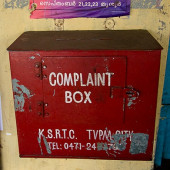Our website uses cookies so we can analyse our site usage and give you the best experience. Click "Accept" if you’re happy with this, or click "More" for information about cookies on our site, how to opt out, and how to disable cookies altogether.
We respect your Do Not Track preference.

We’re transforming our complaints process. We want it to be faster and more flexible with better outcomes for complainants and respondents. It is the reason we have embarked on an office wide ‘complaints blitz’.
Let me explain. In the course of our work in dealing with complaints, cases build up and inevitably, some take longer to resolve than others. Unfortunately, for a variety of reasons, some of them have even been taking longer than six months to close. It’s a reflection of our previous correspondence-driven style of resolving complaints.
That’s why we came up with the idea of the blitz on complaints. The strategy is to reduce the number of complaints across the board so that our investigators will in future be dealing with fewer complaints at any one time. They will then be able to apply a more focused and flexible approach to cases while employing more innovative ways of dealing with them.
The circumstances of complaints work means we usually deal with unhappy and aggrieved people. If you are unfamiliar with complaints resolution, we can tell you that it is rewarding but often tough work. Getting two parties in a dispute to settle takes negotiation and time.
But whether we like it or not, expectations are changing. People, quite rightly, expect things to move more quickly and for complaints to be resolved or determined more promptly. We have to maximise the modern communications tools at our disposal to bring this about.
Part of the blitz means being more assertive in managing our existing dispute resolution processes, and where they fail, promptly moving to write up the determinations or outcomes of our investigations. We’ve already written about one of the tools we are employing to fuller effect – compulsory meetings.
For the purpose of the blitz, each of our investigating officers has been given a caseload that takes into account file numbers and complexity. Manageable doesn’t necessarily mean 35 files, or 15 hard ones, or 45 easy ones. What it does mean is having the right number to make sure we can close cases in a timely way.
So far, we appear to be winning. Last year, we received 725 complaints. In the past couple of months, we’ve managed to halve the number of complaint files that are over six months old. We want to be able to close most cases within weeks, and as the blitz progresses, we are conscious that as an office we must maintain pressure on our existing workload in order to get to where we want to be.
The half way point marks the beginning of this second phase - a reimagining or reconfiguring of our complaints process. All our staff are engaged with this project and we’re thrilled by the early results.
Equally importantly, we want our new approach to put greater responsibility on complainants and respondents to engage in finding their own resolutions of complaints. And where that does not prove possible, we want to move promptly to a determination. This is a process that we are committed to making work and we trust it will result in delivering a better service to you.
Back